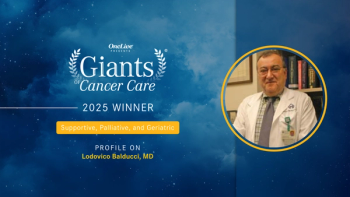
PISCES Trial and Patient Treatment Preference in mRCC
For High-Definition, Click
The treatment decision for newly diagnosed patients with metastatic renal cell carcinoma (mRCC) can be guided by several factors, including patient preference. To cull this notion out further, the PISCES trial was undertaken to assess which TKI patients preferred as a front-line treatment: sunitinib or pazopanib.
PISCES was a relatively small study that included 168 patients with newly diagnosed mRCC, explains Eric Jonasch, MD. In the study, patients were randomized to pazopanib or sunitinib for 10 weeks followed by a two week washout period and finally the opposite TKI. In the primary analysis it was reported that 70% of patients preferred treatment with pazopanib to sunitinib. These findings were assessed using an efficacy-blinded questionnaire, Jonasch notes. Moreover, this assessment did not indicate a patient's level of preference.
The PISCES study was a unique and novel trial; however, the exclusion of efficacy from the analysis may have altered the outcomes, believes Brian I. Rini, MD. Efficacy offers the benefit portion to a risk-benefit assessment and plays an important role in both doctor and patient preference, Rini states. Another shortcoming of the trial, Rini adds, was that dose interruptions were not allowed, which naturally introduces imbalances and biases.
At this point, there are eight drugs available to treat patients with mRCC, points out Robert A. Figlin, MD. As such, researchers are beginning to compare these agents to each other in terms of the balance between efficacy and tolerability. However, Figlin believes, researchers should continue to move the field forward by exploring next-generation therapies.
Overall, the panelists do not believe that results from the PISCES study will impact their practices. Taken together the COMPARZ and PISCES studies indicate that sunitinib and pazopanib are both safe and effective as frontline treatments for mRCC, Figlin indicates. However, Thomas E. Hutson, DO, PharmD, notes, these results may have an impact on patient conversations, especially since patients may hear about these agents online before their appointment. Along these lines, Figlin notes, patient education should comprise a large portion of the patient-doctor conversation. In this talk, physicians should be synthesizing data, interpreting information, and making individualized decisions. Ultimately, however, as experts, the physicians should be making the treatment decision.





































